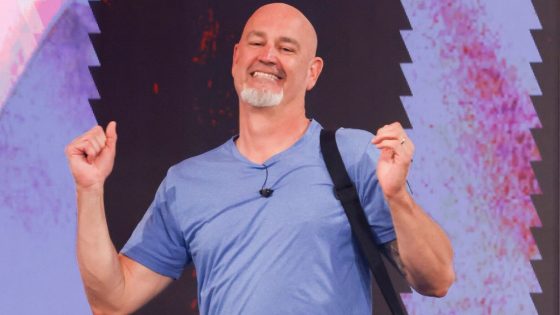WARNING: This story contains distressing details.
The trial of an admitted Winnipeg serial killer heard duelling arguments Monday during closing submissions about whether Jeremy Skibicki was driven by psychotic symptoms and delusions linked to schizophrenia when he killed four women in 2022, or whether he preyed on vulnerable women at homeless shelters before committing four planned, deliberate murders.
Defence lawyers and prosecutors each tried to poke holes in the credibility of the forensic psychiatrist the other side enlisted to assess Skibicki’s mental state — key evidence in a trial where the accused has admitted to the killings, but is asking to be found not criminally responsible due to a mental disorder.
Those attempts included urging from prosecutors for the judge to completely reject testimony from U.K.-based Dr. Sohom Das, the defence expert who testified it was his opinion Skibicki, 37, should be found not criminally responsible because of schizophrenia.
Crown attorney Christian Vanderhooft called that a “preposterous conclusion” fed by a “self-serving” story Skibicki told the expert about hearing voices and acting on delusions that he was on a mission from God, which he said was why he killed the women and performed sex acts on their bodies.
Prosecutors argued Das’s evidence should be given “very little if any weight” based on concerns surrounding his credibility, in part because of YouTube videos that came under scrutiny during the trial.
Those concerns also included a failure to consider all the material and possibilities available to him (including Skibicki searching online for things such as the definition of a serial killer), and an opinion underpinned by flawed reasoning and a weak factual foundation, Crown attorney Renée Lagimodière said.
WATCH | What does not criminally responsible mean?:
The defence team in the trial of Jeremy Skibicki are arguing in a Winnipeg courtroom this week that he should be found not criminally responsible. But what does that mean and what are the consequences for the accused? CBC reporter Caitlyn Gowriluk explains.
Defence lawyer Leonard Tailleur levelled a similar criticism against Dr. Gary Chaimowitz, the Ontario-based forensic psychiatrist who assessed Skibicki for the Crown. He testified he believed the accused made up his delusions and that Skibicki was actually motivated by racism and a homicidal necrophilia, or an arousal to having sex with people he’s killed.
“He listened to Mr. Skibicki, he took all of the parts that he wanted to fit into his hypothesis,” Tailleur said. “He threw away everything else.”
Skibicki has pleaded not guilty to four first-degree murder charges in the deaths of three First Nations women — Rebecca Contois, 24, Morgan Harris, 39, and Marcedes Myran, 26 — and an unidentified woman community leaders have given the name Mashkode Bizhiki’ikwe, or Buffalo Woman, who police have said they believe was an Indigenous woman in her 20s.
The women are believed to have been killed between March and May 2022.

Contois’s partial remains were found in garbage bins near Skibicki’s apartment in May 2022, and more were later discovered during a search of a Winnipeg landfill. Harris’s and Myran’s remains are believed to be in another landfill outside the city, which the provincial and federal governments each pledged $20 million earlier this year to search.
After closing arguments in the trial wrapped up on Monday, dozens of people gathered for a rally outside the Winnipeg law courts. Some sang and drummed, while others chanted “bring them home” or held signs saying “search the landfill” or “a garbage dump is not a grave site.”
At one point, a round dance in a nearby intersection briefly blocked traffic.

Organizer Joseph Munro said the rally was held to show support for the victims’ families.
“This is when everything is out on the table,” he said. “And the families have been going through so much trauma.”
Premier Wab Kinew said now that the trial is over, the province “will soon be in a position to speak much more freely” about when the landfill search might happen. He said families of the victims will get an update during a meeting Tuesday, before the government updates the public on its next steps.
Case about ‘truth of a horrifying confession’: prosecutors
Crown attorney Vanderhooft said while Skibicki unexpectedly confessed to killing all four women during a 2022 police interview, after Contois’s partial remains were found, the confession itself “wasn’t as shocking as the fact that those admissions turned out to be true.”
“And that is what this case is about: the truth of a horrifying confession that police objectively verified with an intensive and lengthy investigation,” Vanderhooft said.
Though Skibicki’s lawyers are now arguing he should be found not criminally responsible due to a mental disorder, the prosecutor said “nothing could be further from the truth, or the inescapable conclusion that all of these murders were planned and deliberate and committed in the course of forcible confinement and sexual assault” — meaning the killings qualify for first-degree murder charges on two different avenues under the Criminal Code.
Prosecutors reiterated their argument that the killings were intentional and racially motivated, as well as being done to fulfil what Crown attorney Lagimodière described as “deviant sexual urges” — acts that expert Chaimowitz testified last week would not have been physically possible to carry out if Skibicki had in fact been driven solely by delusions and not aroused.
Lagimodière said the evidence presented at trial, which included details about how Skibicki took steps to dispose of the women’s remains and his allusion to the killings afterward to his ex-wife, shows he knew what he was doing was wrong and makes him ineligible to be found not criminally responsible.
Defence lawyer Tailleur pointed to Skibicki’s medical records as evidence of a history of schizophrenia and symptoms including hearing voices. Prosecutors, however, argued there’s no evidence to support that, and said any mentions of schizophrenia in the accused’s medical history appear to be from self-reporting, not diagnosis by a psychiatrist.
As the Crown wrapped up its arguments, Vanderhooft said he wanted to end with an answer to a question Skibicki searched online for, just after he’s believed to have killed the third of his victims.

“To answer Mr. Skibicki’s own question when he did a Google search on May 5, 2022, at 5:15 a.m. — less than 12 hours after he was seen walking towards his apartment with Ms. Myran — “what is the definition of a serial killer?” he said. “The answer, Mr. Skibicki, is you.”
Outside court after closing arguments, defence lawyer Tailleur said he and the rest of Skibicki’s defence team “reject entirely” the homicidal necrophilia diagnosis given by the Crown’s expert, and said they felt they needed to find a forensic psychiatrist from outside Canada to testify for the defence because the victims were Indigenous women.
“Because every psychiatrist, we felt, in Canada, would have the pall around them of 200 years of oppression of Indigenous people. And so it would be impossible for that psychiatrist to say anything else than what the Crown basically was looking for in the case,” Tailleur told reporters, adding there’s been a “tremendous emotional impact” representing someone who’s admitted to killing four people.
“So as a criminal defence attorney, with that in mind, I mean … a huge part of us is our humanity, too. And that’s why I described what happened between March and May 2022 as catastrophic in every sense of the word.”
Court of King’s Bench Chief Justice Glenn Joyal reserved his decision in the judge-alone trial until July 11.
Support is available for anyone affected by these reports and the issue of missing and murdered Indigenous people. Immediate emotional assistance and crisis support are available 24 hours a day, seven days a week through a national hotline at 1-844-413-6649.
You can also access, through the government of Canada, health support services such as mental health counselling, community-based support and cultural services, and some travel costs to see elders and traditional healers. Family members seeking information about a missing or murdered loved one can access Family Information Liaison Units.
Source Agencies




